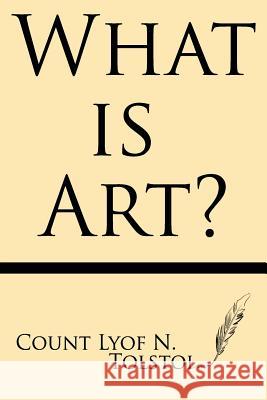What Is Art » książka
What Is Art
ISBN-13: 9781628450460 / Angielski / Miękka / 2013 / 212 str.
What is Art?
By Count Lyof N. Tolstoi
THIS book of mine, "What is Art? " appears now for the first time in its true form. More than one edition has already been issued in Russia, but in each case it has been so mutilated by the " Censor," that I request all who are interested in my views on art only to judge of them by the work in its present shape. The causes which led to the publication of the book - with my name attached to it - in a mutilated form were the following: In accordance with a decision I arrived at long ago, - not to submit my writings to the " Censorship " (which I consider to be an immoral and irrational institution), but to print them only in the shape in which they were written, - I intended not to attempt to print this work in Russia. However, my good acquaintance, Professor Grote, editor of a Moscow psychological magazine, having heard of the contents of my work, asked me to print it in his magazine, and promised me that he would get the book through the "Censor's" office unmutilated if I would but agree to a few very unimportant alterations, merely toning down certain expressions. I was weak enough to agree to this, and it has resulted in a book appearing under my name, from which not only have some essential thoughts been excluded, but into which the thoughts of other men - even thoughts utterly opposed to my own convictions - have been introduced. The thing occurred in this way. First, Grote softened my expressions, and in some cases weakened them. For instance, he replaced the words: always by sometimes, all by some, Church religion by Roman Catholic religion, " Mother of God " by Madonna, patriotism by pseudo-patriotism, palaces by palatii, etc., and I did not consider it necessary to protest. But when the book was already in type, the Censor required that whole sentences should be altered, and that instead of what I said about the evil of landed property, a remark should be substituted on the evils of a landless proletariat. I agreed to this also, and to some further alterations. It seemed not worthwhile to upset the whole affair for the sake of one sentence, and when one alteration had been agreed to it seemed not worthwhile to protest against a second and a third. So, little by little, expressions crept into the book which altered the sense and attributed things to me that I could not have wished to say. So that by the time the book was printed it had been deprived of some part of its integrity and sincerity. But there was consolation in the thought that the book, even in this form, if it contains something that is good, would be of use to Russian readers whom it would otherwise not have reached. Things, however, turned out otherwise. Nous comptions sans notre hote. After the legal term of four days had already elapsed, the...
------------------------------------------------------------------------------------------------------------------------------------------
Windham Press is committed to bringing the lost cultural heritage of ages past into the 21st century through high-quality reproductions of original, classic printed works at affordable prices.
This book has been carefully crafted to utilize the original images of antique books rather than error-prone OCR text. This also preserves the work of the original typesetters of these classics, unknown craftsmen who laid out the text, often by hand, of each and every page you will read. Their subtle art involving judgment and interaction with the text is in many ways superior and more human than the mechanical methods utilized today, and gave each book a unique, hand-crafted feel in its text that connected the reader organically to the art of bindery and book-making.
We think these benefits are worth the occasional imperfection resulting from the age of these books at the time of scanning, and their vintage feel provides a connection to the past that goes beyond the mere words of the text.











